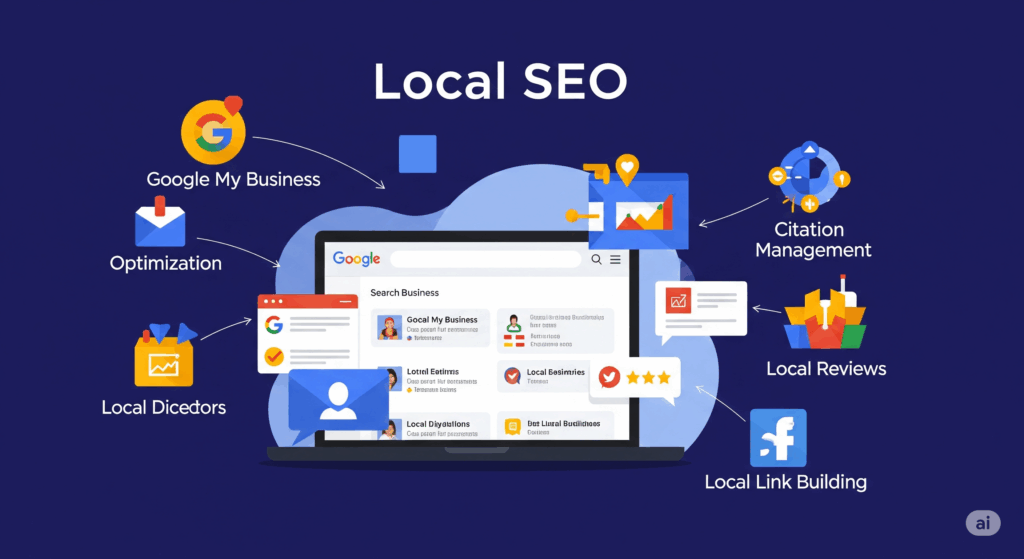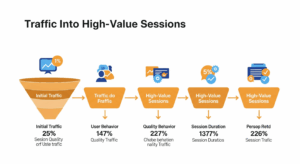Have you ever searched for a “bakery near me” or a “plumber in [your city]” and noticed certain businesses consistently pop up first? That’s not random. That’s Local SEO at its best. For any small business with a physical location or a specific service area, being visible in these crucial local searches is the ultimate goal. In today’s mobile-first world, where nearly every local query happens on a smartphone, mastering this visibility is no longer optional – it’s essential.
This isn’t just about getting found; it’s about becoming the undisputed leader in your neighborhood. This comprehensive guide will equip you with the strategies to give your business a significant edge in 2025, 2026, and beyond, ensuring that when local customers search, they find you.
Your Digital Shop Window: Optimizing Google Business Profile
Consider your Google Business Profile (GBP) as your most powerful online marketing tool for attracting local customers. It often provides the very first impression a local searcher gets of your business. Diligently optimizing and maintaining this profile is absolutely critical for improving your local search visibility.
Here’s how to ensure it stands out:
- Complete and Consistent NAP Details: Your Name, Address, and Phone number (NAP) must be flawlessly accurate and identical across every online platform where your business is listed. This consistency builds immense trust with Google. Also, keep your business hours, website link, and service offerings meticulously updated.
- Strategic Category Selection: Choose the most precise primary category that defines your business, then add as many relevant secondary categories as possible. This helps Google fully understand your services.
- High-Quality Visuals: Upload compelling, high-resolution photos of your storefront, interior, team, and products. Videos or even a 360-degree virtual tour can give potential customers a fantastic sense of your space. Regularly refreshing these visuals signals activity to Google.
- Engage with Google Posts: Use this dynamic feature on your GBP to share timely updates, special promotions, upcoming events, or new product arrivals. These posts encourage frequent interaction and show Google your business is active.
- Manage the Q&A Section: Actively monitor and provide helpful, concise answers to questions posed by users. This is an excellent opportunity to naturally integrate local keywords and address common customer inquiries.
- Leverage Business Attributes: Take advantage of specific attributes to highlight unique offerings or amenities (e.g., “wheelchair accessible,” “Wi-Fi available,” “dog-friendly”). These details can cater to specific user preferences.
Google increasingly rewards GBP listings that are not just comprehensive but also consistently active and engaging.
Understanding Local Voices: Intelligent Keyword Research
The era of generic keywords is past. Now, it’s about understanding the precise phrasing your local audience uses to find businesses like yours. Local keyword research involves uncovering exactly how people in your community search for the products or services you offer.
Put yourself in a local customer’s shoes:
- Location-Specific Modifiers: Think about how people combine your service or product with local identifiers. Examples include “best coffee shop downtown” or “emergency dentist [your specific neighborhood].”
- “Near Me” and “Open Now” Queries: These are incredibly common on mobile. While you don’t directly optimize for “near me,” a thoroughly optimized GBP and website will naturally rank for these implicit location-based searches.
- Google’s Built-In Tools: Utilize Google’s autocomplete suggestions as you type in your core terms. The “People Also Ask” section in search results is a goldmine for discovering valuable long-tail and conversational queries relevant to your business.
- Competitor Analysis: Research what keywords your successful local competitors are ranking for. This can reveal overlooked opportunities for your own strategy.
- Voice Search Considerations: With the proliferation of smart speakers and voice assistants, searches are often more natural and conversational. Anticipate questions like “Hey Google, where’s a good brunch spot in [your city]?”
Speaking Google’s Language: Structured Data for Local Businesses
Schema markup, also known as structured data, is code that helps search engines fully understand the context of your website’s content. For local businesses, it’s a powerful method to explicitly provide information about your entity, making it easier for Google to display your business prominently in search results, often as “rich snippets” or directly within the local pack.
Key schema types crucial for local businesses include:
- LocalBusiness Schema: This is foundational. It tells Google your business name, address, phone number, operating hours, and other essential details.
- Review/AggregateRating Schema: This helps Google comprehend and display your customer reviews, which can significantly boost your visibility and credibility in local search results.
- Service & Product Schema: If your business offers specific services or products, marking them up with schema can help you appear in highly targeted local searches for those offerings.
- FAQPage Schema: For any FAQ sections on your website, this can help your content appear directly within “People Also Ask” boxes, which is particularly beneficial for voice search optimization.
Building Your Local Web: Strategic Link Building
Backlinks – links from other reputable websites pointing to yours – remain a strong signal of authority to search engines. For local SEO, the emphasis shifts to local relevance. You want links from other respected businesses, organizations, and community resources within your area.
Consider these impactful local link building tactics:
- Local Directories and Citations: Ensure your business is listed accurately and consistently across all major local directories (e.g., Yelp, industry-specific sites) and local chambers of commerce. These consistent citations of your NAP are crucial for local ranking.
- Community Partnerships: Explore collaborations with non-competing local businesses. Can you co-host an event, offer reciprocal discounts, or create shared content? These initiatives often lead to valuable backlinks.
- Sponsor Local Events/Teams: Sponsoring a community event, a local sports team, or a charity often includes a link from their website. It’s a fantastic way to engage with your community while earning valuable SEO benefits.
- Local Content Creation: Develop content that highlights local issues, events, or comprehensive guides specific to your area. For instance, “The Best [Your Product] Suppliers in [Your City]” or “A Visitor’s Guide to [Local Attraction].” This type of content naturally attracts links from other local resources.
Protecting Your Promise: Online Reputation Management
In today’s review-driven world, your online reputation is paramount. Positive reviews build trust and act as a powerful ranking factor for local SEO. Conversely, negative reviews, if not skillfully addressed, can deter potential customers.
- Proactively Solicit Reviews: Make it simple for satisfied customers to leave reviews on your GBP and other relevant platforms. A gentle reminder at the point of service or via a follow-up email can be very effective.
- Respond to All Reviews: Whether feedback is positive or negative, responding shows you are attentive and value customer input. For negative reviews, respond professionally, empathetically, and always offer a constructive solution.
- Monitor Mentions: Use tools like Google Alerts to track mentions of your business name across the web. This allows you to quickly address any issues or capitalize on positive buzz.
- Encourage Diverse Reviews: Aim for reviews across various platforms, not just Google. This diversifies your digital footprint and strengthens your overall online presence.
The Rise of Conversational Search: Adapting to Voice Queries
Voice search is experiencing explosive growth, particularly for local queries. People are increasingly using natural, conversational language with their smart devices: “Okay Google, where’s the nearest pizza place that delivers?” or “Siri, find me a dry cleaner open late.”
To align your local SEO strategy for voice search:
- Conversational Content: Your website content should be written in a natural, approachable tone, mirroring how people speak. Focus on directly answering potential questions.
- Long-Tail Keyword Focus: Voice queries tend to be longer and more specific. Optimize for these longer, more detailed phrases, often structured as questions.
- Aim for Featured Snippets: Voice assistants frequently pull their answers directly from Google’s featured snippets. Structure your content with clear headings and concise answers to increase your chances of appearing here.
- Comprehensive FAQs: Create detailed FAQ sections on your website that directly address common questions your customers might ask via voice search.
- Impeccable GBP Data: Voice searches heavily rely on accurate information from your Google Business Profile. Ensure all details, especially operating hours and your exact address, are perfect.
The Mobile-First Imperative: Beyond Just Responsive Design
It bears emphasizing: we are firmly in a mobile-first world. If your website isn’t fast, truly responsive, and intuitively easy to navigate on a smartphone, you are likely losing potential customers before they even consider visiting your business.
- Seamless Mobile-Friendly Website: Your website must adapt flawlessly to any screen size, providing a smooth and efficient user experience.
- Lightning-Fast Page Speed: Mobile users expect instant results. Optimize your website’s loading speed relentlessly. Utilize tools like Google PageSpeed Insights to pinpoint areas for improvement.
- Intuitive Mobile Navigation: Design simple, clear navigation for smaller screens. Make it effortless for users to find your address, phone number, and services within a few taps.
- Click-to-Call Functionality: Ensure your phone number is a clickable “click-to-call” link on mobile devices, allowing users to contact you instantly.
Your Local Leadership: A Continuous Journey
Local SEO domination isn’t a one-time project; it’s an ongoing, dynamic process. The digital landscape constantly evolves, and your strategy must evolve with it. Regularly audit your online presence, meticulously analyze your performance data, and stay current with the latest trends and Google algorithm updates.
For small businesses, mastering local SEO isn’t merely about attracting new customers; it’s about building a formidable, trusted presence within your community. By diligently optimizing your Google Business Profile, excelling at local keyword research, implementing schema markup, fostering strategic local links, meticulously managing your online reputation, and thoughtfully adapting to voice search, you’re not just competing – you’re truly poised to lead your local market into 2025 and beyond. What steps will you take today to secure your local leadership?







